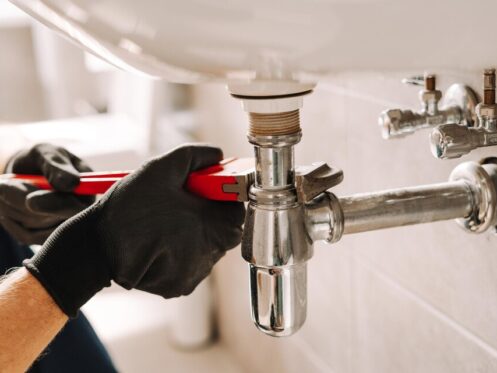Winter brings its unique set of challenges, especially when it comes to plumbing. Cold temperatures can wreak havoc on your home’s plumbing system, leading to problems that can be both inconvenient and costly. Understanding common winter plumbing issues and how to address them can save you from unexpected hassles and repair bills.
Preventing Frozen Pipes
Frozen pipes are one of the most common winter plumbing issues. They can lead to serious damage if not properly managed. Fortunately, there are several methods to prevent pipes from freezing.
Insulate Your Pipes
Insulating pipes is one of the most effective ways to prevent freezing. Use pipe insulation materials to wrap the pipes exposed to cold temperatures, especially those in unheated areas like basements or garages. This simple step helps retain heat and prevent freezing.
Keep a Steady Temperature
During severe cold weather, keep your thermostat set to the same temperature both day and night. A consistent temperature helps prevent the pipes from experiencing freeze-thaw cycles, reducing the risk of freezing.
Let Faucets Drip
Allowing faucets to drip slightly during extremely cold weather can prevent freezing. The trickle of water keeps the pipes from freezing by relieving pressure buildup. It is especially effective for pipes running through exterior walls.
Dealing with Burst Pipes
Burst pipes are a severe issue that can cause significant water damage if not addressed promptly. Knowing how to deal with burst pipes can minimize damage and restore your plumbing system quickly.
Shut Off the Water Supply
The first step in dealing with a burst pipe is to shut off the main water supply. This action stops the flow of water and prevents further flooding. Everyone in the household should know the location of the main water valve for quick response.
Drain the System
After shutting off the water supply, drain the water remaining in the pipes. Turn on all the faucets, flush the toilets, and leave the faucets open. Draining the system reduces the pressure in the pipes and minimizes the amount of water escaping the burst pipe.
Call Our Professionals
While you can take immediate steps to control the situation, professional repair is crucial. Our professionals have the tools and expertise to repair or replace burst pipes. They will also check the system for any signs of additional damage to ensure the safety and functionality of your plumbing.
Fixing Low Water Pressure in Winter
Low water pressure during winter can be frustrating and may indicate an issue with your plumbing. Addressing this problem promptly can restore normal water flow and prevent further complications.
Check for Frozen Pipes
Frozen pipes are a common cause of low water pressure in winter. Inspect the pipes for any signs of freezing, such as visible frost or bulging sections. If you find a frozen pipe, use a hairdryer or a space heater to thaw it gradually. Avoid using an open flame, as it can damage the pipes or cause a fire.
Inspect and Clean Faucets
Clogged aerators and faucets can also lead to low water pressure. Remove the aerators and clean them to ensure they are not obstructing the water flow. Cleaning the faucet heads can also help improve water pressure.
Evaluate the Pressure Regulator
If your home has a pressure regulator, it might be malfunctioning during the winter months. Adjusting or replacing the pressure regulator can often resolve issues with low water pressure. If you’re unsure how to do this, consulting our professionals may be the best course of action.
Unclogging Drains and Gutters
Winter weather can lead to clogged drains and gutters that cause significant problems for your plumbing. Keeping these systems clear ensures proper drainage and prevents water damage.
Clear Debris Regularly
Leaves, ice, and other debris can accumulate in gutters and drains during winter. To prevent clogs, regularly check and clear these areas. When cleaning gutters, use a sturdy ladder and gloves for safety. A plumber’s snake or a high-pressure water hose can be useful tools for unclogging drains.
Install Gutter Guards
Gutter guards are effective in preventing debris from entering your gutters. These guards allow water to flow freely while blocking leaves and other debris. Installing gutter guards can reduce the frequency of clogs and the need for manual cleaning.
Use Drain Screens
Place screens over drains to catch hair, soap scum, and other debris that can cause clogs. These screens are easy to install and can prevent significant blockages in your plumbing system.
Conclusion
Winter poses various challenges for your plumbing system, but understanding how to prevent and address common issues can save you time and money. From frozen pipes to low water pressure and clogged drains, proactive measures and timely interventions are key to maintaining a functional plumbing system.
For expert help with all your plumbing needs, contact the professionals at Midwest Mechanical. Our team is ready to ensure your plumbing system runs smoothly and efficiently all winter long. Reach out to us today for reliable and professional plumbing services!
